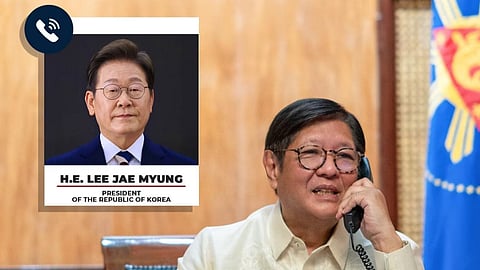
- NEWS
- the EDIT
- COMMENTARY
- BUSINESS
- LIFE
- SHOW
- ACTION
- GLOBAL GOALS
- SNAPS
- DYARYO TIRADA
- MORE

The Philippines’ plan to build 350 modular bridges in rural areas hit a roadblock after South Korea canceled its P28.7-billion infrastructure loan.
South Korean President Lee Jae-myung announced the decision on Facebook, citing the project’s “potential for corruption.” The move followed an exclusive report by the center-left daily, The Hankyoreh.
The loan cancellation comes amid a major corruption scandal in the Philippines involving flood control projects, which has sparked intense House and Senate investigations into a suspected collusion between politicians and contractors who allegedly misappropriated funds meant to prevent river overflows during typhoons.
Risk of corruption, mismanagement
“The bridges project, which was deemed substandard with a high corruption risk, was immediately ordered to cease,” Lee said. The move, he added, “prevented the unnecessary waste of 700 billion won in taxpayer money and blocked the risk of corruption and mismanagement.”
The loan, part of South Korea’s Economic Development Cooperation Fund (EDCF), was intended to fund Philippine President Ferdinand Marcos Jr.’s plan to build 350 modular bridges across rural areas.
However, South Korea’s Ministry of Strategy and Finance initially flagged the project as high-risk, pointing to challenges in managing scattered sites, high local permit costs, poor transportation infrastructure, and past corruption issues with local contractors.
A Philippine company involved in a similar project in the past had built unusable bridges and faced corruption allegations.
Despite these concerns, the project was revived after pressure was exerted by Rep. Kwon Seong-dong of South Korea’s ruling People Power Party.
According to The Hankyoreh, Kwon repeatedly contacted Finance Minister Choi Sang-mok, urging him to reconsider and even linking the project to potential access to Philippine nickel mining rights.
Kwon also claimed major Korean firms like Daewoo E&C and Sambu Construction were ready to participate, though both later cited management difficulties due to the project’s scale.
After multiple rounds of lobbying, the Ministry of Finance approved a feasibility study for a smaller version of the project in October 2024. The project was scaled down from 350 bridges to 70, and the budget was cut from 710 billion won to about 110-130 billion won (P4.5-P5.3 billion).
While the study would assess its technical, economic, and environmental feasibility, earlier reviews suggested that even a pilot project might fail due to inadequate infrastructure.
Rep. Kwon, a former prosecutor and five-term lawmaker closely allied with President Yoon Suk Yeol, had never served on committees overseeing foreign aid projects. His involvement appeared to trace back to a surprise visit to the Philippines in 2022 as a special envoy.
Since then, he had frequently attended Korea-Philippines meetings, including economic cooperation conferences where the rural bridge project was discussed.
Hankyoreh reported that Kwon and his aides did not respond to requests for comment.
DoF: No such loan
In the Philippines, officials scrambled to downplay the report.
“With regard to the supposed P28 billion official development assistance (ODA) loan between South Korea and the Philippines, the Department of Finance (DoF) categorically clarifies that no such loan exists,” the DoF statement read.
“Nevertheless, we reaffirm to our bilateral partners that the Philippine government will match their trust and confidence with full transparency and accountability,” it added.
The DoF clarified that the project is being proposed for financing by the Government of France, not South Korea.
According to the DoF, the project was initially explored with South Korea, but the Department of Agrarian Reform (DAR) halted talks last year after disagreements on scope and technical details. By late 2024, the government began seeking other bilateral partners that could cover the full scope of the project.
“There is no existing loan with South Korea for this project,” the agency stressed.
Talks are now in the advanced stage with France, with technical and financial terms expected to be finalized soon.
DA bares bridge plan
Last June, Agriculture Secretary Francisco Tiu Laurel Jr. announced plans to build 300 modular steel panel bridges in 52 provinces across 15 regions from 2026 to 2029 under a P27.7-billion Farm-to-Market Bridges Development Program (FMBDP).
Laurel said the FMBDP, approved by the Economy and Development Council, would be funded with P22.15 billion from France’s official development assistance (ODA) and other loans, plus P5.54 billion from the Philippine government.
The 300 bridges, spanning more than 11,400 meters, will include 296 extra-wide single-lane bridges and four standard single-lane bridges, prioritizing agricultural regions with limited access to key markets.
From 1,428 proposed sites, the top 300 were selected using a framework developed by the DA’s Bureau of Agricultural and Fisheries Engineering. Laurel emphasized that the project was about more than infrastructure — it aimed to increase farmers’ and fisherfolk’s incomes by improving access to markets and cutting transport costs.
He added that the FMBDP would promote balanced regional development and inclusive economic growth. Construction is set to begin next year and continue through 2029.
